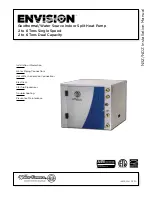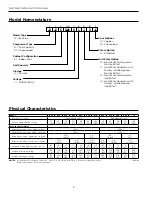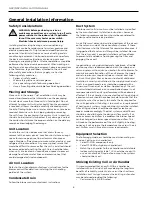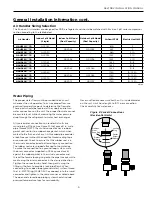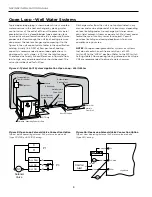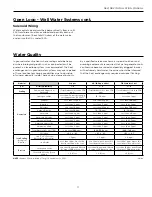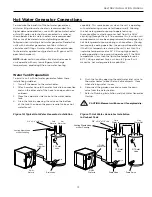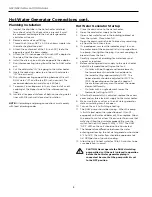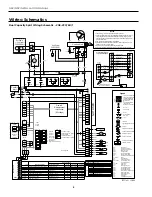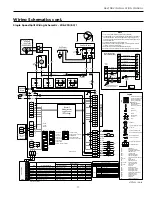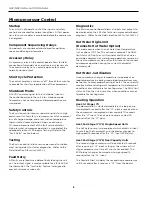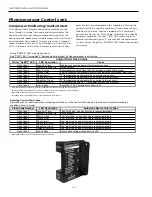
11
NSZ/NDZ INSTALLATION MANUAL
Solenoid Wiring
Water control valves draw their power directly from a unit’s
24V transformer and can overload and possibly burn out
the transformer. Check total VA draw of the water valve
and ensure that it is under 15 VA.
Open Loop - Well Water Systems cont.
Material
Copper
90/10 Cupronickel
316 Stainless Steel
pH
Acidity/Alkalinity
7- 9
7 - 9
7 - 9
Scaling
Calcium and Magnesium
Carbonate
(Total Hardness) less than 350
ppm
(Total Hardness) less than 350
ppm
(Total Hardness) less than 350
ppm
Corrosion
Hydrogen Sulfide
Less than .5 ppm (rotten egg
smell appears at 0.5 PPM)
10 - 50 ppm
Less than 1 ppm
Sulfates
Less than 125 ppm
Less than 125 ppm
Less than 200 ppm
Chlorine
Less than .5 ppm
Less than .5 ppm
Less than .5 ppm
Chlorides
Less than 20 ppm
Less than125 ppm
Less than 300 ppm
Carbon Dioxide
Less than 50 ppm
10 - 50 ppm
10- 50 ppm
Ammonia
Less than 2 ppm
Less than 2 ppm
Less than 20 ppm
Ammonia Chloride
Less than .5 ppm
Less than .5 ppm
Less than .5 ppm
Ammonia Nitrate
Less than .5 ppm
Less than .5 ppm
Less than .5 ppm
Ammonia Hydroxide
Less than .5 ppm
Less than .5 ppm
Less than .5 ppm
Ammonia Sulfate
Less than .5 ppm
Less than .5 ppm
Less than .5 ppm
Total Dissolved Solids (TDS)
Less than 1000 ppm
1000-1500 ppm
1000-1500 ppm
LSI Index
+0.5 to -.05
+0.5 to -.05
+0.5 to -.05
Iron Fouling
(Biological
Growth)
Iron, Fe
2
+ (Ferrous)
Bacterial Iron Potential
< .2ppm
< .2 ppm
< .2 ppm
Iron Oxide
Less than 1 ppm. Above this
level deposition will occur.
Less than 1 ppm. Above this
level deposition will occur.
Less than 1 ppm. Above this
level deposition will occur.
Erosion
Suspended Solids
Less than 10 ppm and filtered
for max of 600 micron size
Less than 10 ppm and filtered
for max of 600 micron size
Less than 10 ppm and filtered
for max of 600 micron size
Threshold Velocity (Fresh
Water)
< 6 ft/sec
< 6 ft/sec
<6 ft/sec
2/8/08
NOTE:
Grains = PPM divided by 17 mg/l is equivalent to PPM
In ground water situations where scaling could be heavy
or where biological growth such as iron bacteria will be
present, a closed loop system is recommended. The heat
exchanger coils in ground water systems may, over a period
of time, lose heat exchange capabilities due to a buildup
of mineral deposits inside. These can be cleaned, but only
Water Quality
by a qualified service mechanic, as special solutions and
pumping equipment are required. Hot water generator coils
can likewise become scaled and possibly plugged. In areas
with extremely hard water, the owner should be informed
that the heat exchanger may require occasional flushing.

